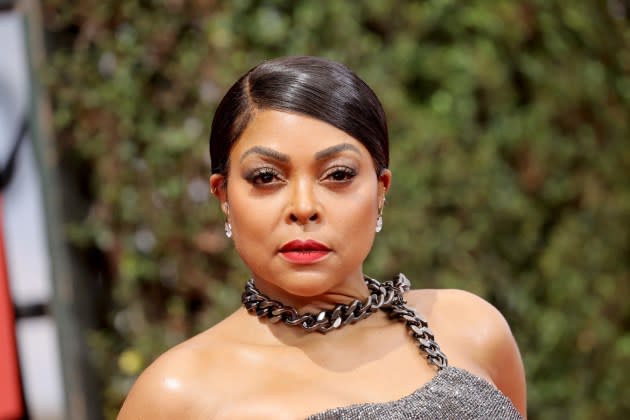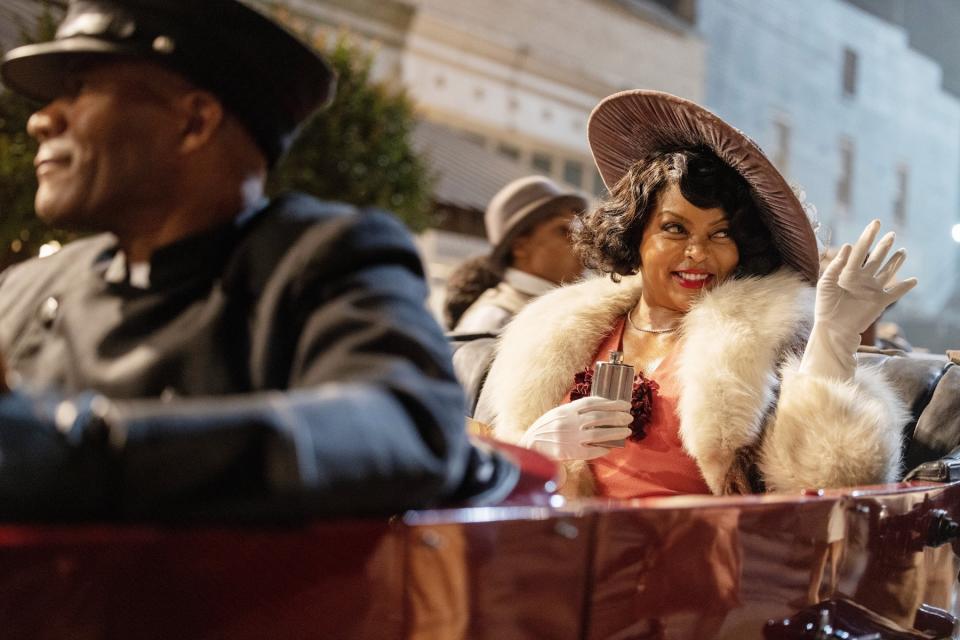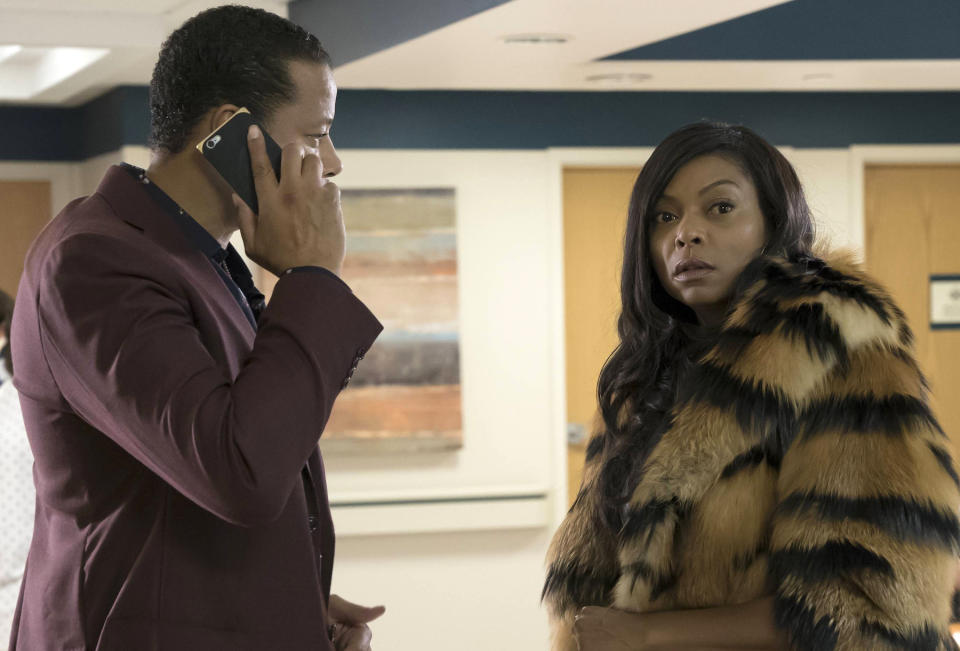Taraji P. Henson Is No Longer Settling
- Oops!Something went wrong.Please try again later.

Taraji P. Henson is no stranger to hustle. Throughout college, she spent most post-class evenings singing, dancing, and waiting tables on a D.C. cruise ship and her early mornings as a receptionist at The Pentagon to help cover her Howard University tuition. Henson still wears many hats as the owner of the haircare line TPH by Taraji, the founder of the mental wellness nonprofit Boris Lawrence Henson Foundation, and most recently as the brazen Shug Avery in the blockbuster musical The Color Purple.
“I just had my house remodeled: I have an infrared sauna, I have a steam shower, and I have a Japanese soaking tub,” Henson admits, later plugging her in-home salon. “So, you know, I really take time. I look forward to ‘luxuriating’ — that’s what I call it.”
More from Rolling Stone
Hollywood Still Isn't Hiring Many Women or People of Color to Direct Major Films
Chaka Khan: I Might Quit Touring 'Three or Four Times, Like Other Bitches Do'
The seasoned actress has spent decades breathing life into fierce, iron-willed characters like a sharp mathematician in Hidden Figures, a pregnant singer in Hustle & Flow, and a non-nonsense entertainment mogul in Empire. Although her performance as a caretaker in The Curious Case of Benjamin Button landed the actress an Oscar nomination, she had to fight to earn a salary that was even a fraction of star Brad Pitt’s. (She was offered $75,000 and settled with $150,000 for the role; Pitt was paid a reported $10 million.)
“I wasn’t the Taraji I am today, so I couldn’t fight anymore,” Henson says. “Because if I said no, if I tried to fight for more money, then I probably would have been replaced or they would’ve gotten somebody else that’ll do it for that amount. I knew how important that role was. I had to swallow my ego and do it.”
Henson initially turned down The Color Purple on Broadway due to its grueling eight-show work week, but as the onscreen Shug, a free-spirited performer with a taste for lust, liberation, and opulent gowns, she says she’s never felt sexier. The Color Purple, based on Alice Walker’s Pulitzer Prize-winning novel and the Tony-Award winning musical, earned an impressive $18 million on Christmas Day, marking the second-largest Christmas Day opening ever. The musical’s cast includes a mix of Color Purple Broadway veterans and newcomers like Fantasia Barrino (Celie), Danielle Brooks (Sofia), Colman Domingo (Mister), Corey Hawkins (Harpo), and is up for two Golden Globes as well as Best Picture at the Critics Choice Awards.
Henson tells Rolling Stone that she’s not a competitor by nature and acts for the sake of art, rather than the accolades. We watched her embrace Viola Davis after losing to the How to Get Away with Murder actress at the 2015 Emmys. And despite an Oscar-nomination snub for Hidden Figures, she expressed unwavering support for co-star Octavia Spencer. This awards season is no different.
“If God sees for me to be nominated, we’ll see. But been there, done that,” Henson says.
You’ve called the 1985 original film and Walker’s novel “Black Shakespeare,” and watching the 2023 rendition really feels like a family reunion. What was it like to be a part of this film and to work alongside such a talented cast and director Blitz Bazawule?
It was amazing from beginning to end. Working with a fresh set of talent that hasn’t really been able to showcase their talent in this kind of way – singing, dancing, and acting – and in such a cultural hit. Blitz did an amazing job of casting not only the right artists, but the right energies to pull this together and make this come to life.

You star as the sultry, soul-driven Shug in The Color Purple, who stirs up a romance with Celie. What attributes do you share with the character?
Well, I’m not afraid to leave everything behind and make my dreams come true. In spite of what people may think, when you do that and you’re bold enough to do that, sometimes people project their fears onto me. I had people project onto me because I was a young mother when I left and moved out West to pursue my dreams. I understand fighting for your dreams in spite of what naysayers have to say. I totally tap into that.
You’ve also said Shug is the sexiest character you’ve gotten to play. What is it about Shug that felt so sexy?
The reason why I think she’s the sexiest character I’ve ever played is because she showed no real skin. Sexy is something that you exude from the inside out. It’s not about skin. Even the moment with Celie was very sexy and intimate and beautiful. It wasn’t about kissing and sex; it’s just two hearts meeting and seeing each other.
Obviously this is not the original film — it’s a reimagination, and the film feels exuberant and radiant. Why was it important to add vibrancy in this rendition?
Everybody knows the history of Black Americans coming from slavery stolen from the motherland — some say “stolen” and some say “sold into slavery” — that’s how we ended up here. I just produced Going to Mars: The Nikki Giovanni Project, and Nikki Giovanni says we’re perfect to go to Mars because we’re the only ones who can make something out of darkness. Because we left a land that we know, came through the unknown to the unknown, and we made something of ourselves, you know what I mean? And so that’s what these characters do. You have to live and find joy, and that’s what we are as people. We turn our trauma into celebration.
You have a song coming out called “Joy,” and I want to know its origins and why it’s important to see Black joy, particularly on screen?
I wrote that song in the darkest moment in history when we had a pandemic. I wrote it during the shutdown and I’m a creative; I couldn’t create the usual way on television or on the stage. So I went into the studio, and I fought for joy in the darkest hours. I don’t know if you remember that was a dark period for me. I had suicidal ideations, as I know a lot of people did, and that was me fighting to find my joy.
Pay disparities are still apparent within entertainment and you’ve been outspoken about it. In your memoir, Around the Way Girl, you mention earning a fraction of what your co-stars did in The Curious Case of Benjamin Button.
Why do we have to fight to make what I make? You know what I made the last movie. Why am I fighting for that? I’m not gonna take less than that. If anything, I’m looking for a raise. That’s what’s so insulting, because it’s not like I’m turning in duds.
You’re incredibly talented and have such range in your storytelling. How are we still here in 2023? How are you handling this?
It’s very frustrating. It’s frustrating and it oftentimes made me want to throw in the towel, because why am I here if I’m not making a difference for those coming up behind me? I’m sick of this being the story of women of color in this industry. We’ve all been talking about it. We’ve all been talking about it our entire career. I’m not the only one. I’m not the first one. My prayer is that we’ll be the last because hopefully something should be done, will be done.
It’s frustrating and it oftentimes made me want to throw in the towel, because why am I here if I’m not making a difference for those coming up behind me? I’m sick of this being the story of women of color in this industry.
The hashtag #OscarsSoWhite was trending in 2015. Do you think the Oscars will be any different this year?
I don’’t get involved in that. I’m not a competitor. If I wanted to compete, I would have become an athlete. God bless whoever is nominated. God bless whoever wins. I don’t ever get wrapped up in that because it raises my anxiety. It makes me feel competitive, and that’s not what I’m here for.
What are you here for? I’m curious.
I’m here for the art, babe. Art. I don’t understand how art can compete. What are we really basing it on? Yeah, all of the performances move me. That’s why I went to go see all the movies.
You’re not a competitor, but are you hoping for an Oscar nomination this year?
I’ve been nominated before, and here I am still fighting to get paid what I got paid the last time, so what are we talking about?

You play these emotionally-driven characters in both Empire and Hustle & Flow, both starring Terrence Howard. What was it like working alongside him?
It was great because I’ve known him for so long and we’ve worked together in Hustle & Flow. I just remember when I read the script, I was like, this is perfect for Terrence. I said, this is literally perfect. I could see the dynamic between us. I totally see the love, hate, I could see us pulling it off. It was just easy going to work because we have such deep trust with each other.
You have an Emmy nomination for your guest performance on Abbott Elementary. What was it like starring in the show?
I remember we were doing That’s My Jam and we were competing against each other. We were backstage and I was just telling her how much I loved the show and I was like, “Girl, if you ever want me on the show, just call. I’ll be there in a heartbeat. I love the show, blah, blah blah.” Two weeks later she calls, and I’m just so flattered and I just go because I’m a huge fan. It was only one day at work, and it was just a good time.
Do you have plans on making an appearance in the new season in February?
I hope so. That’s up to Quinta, but I hope so.
You’ve said you want to shift away from acting before the age of 60. In the meantime, why is it important that you’re still doing this work and who do you do it for?
Hopefully I’m making it better for those coming up behind me and also showing my son that he can make all his dreams come true if you work hard and do right by people. [I’m] leaving a legacy behind, healing some people while I’m on this Earth, [and] hopefully leaving something behind so people can heal long after I’m gone.
Best of Rolling Stone

